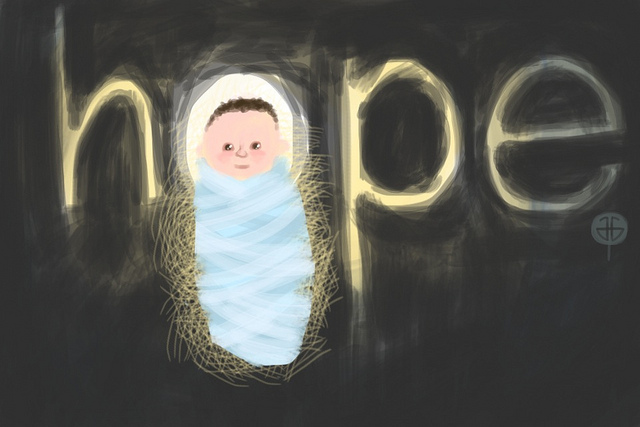It’s almost Christmas. There are songs, pictures, and talk of Sweet Baby Jesus (à la Will Ferrell) everywhere. This baby is invariably adorable and always blessing the people around him.
Which is not, as we know, always true of babies. (Far from it, says this mom of two under 3!)
And it’s also not true that the image of a baby is a blessing for everyone.
A Facebook friend of mine recently posted on the day that should have been the 20-week ultrasound for the baby they lost. Other friends share privately with me their grief at having difficulty conceiving. Miscarriage and infertility are difficult wounds to speak about. There’s often no outward sign of them, nothing to let anyone else know how deeply the person is suffering. The cherished, intimate, almost-holy experience of birth, of getting as close to creating life as we humans can possibly get … well, it’s an open wound for some. And the pictures, the songs, yes perhaps even the sermons about the Sweet Baby Jesus can be salt in that open wound.
Now, please don’t stop reading; this article isn’t to say, “Here’s yet another thing you shouldn’t do as a preacher.” There’s no way we as preachers can possibly acknowledge or speak to every life experience in each sermon. But perhaps more important than speaking is listening to the experiences of miscarriage and infertility at this time of year.
You see, these experiences bear witness — silently and with deep grief — to the thing that popular culture is terrified of admitting: that nothing is outside the reach of our broken conditions. There is no magic talisman that we can look to, touch, or buy that will fix our unhappiness and stifle discontent. Even the image of a tiny, sweet, adorable baby — even that bears traces of brokenness for some.
And if we truly listen to that experience, we will avoid a deep trap that beckons at this time of year: to revel in the sweet strains of the angel’s song — and say nothing else. Christ’s birth never saved anyone. In fact, at the advent of his birth, the local king who was terrified of losing power exercised his wrath upon other innocent babes of Bethlehem aged 2 and younger and had them slaughtered. Those texts are usually skipped over during the Christmas season, but this year we have the chance to preach them on Dec. 28. And intimidating as they may seem, perhaps there is more to offer there than initially meets the eye.
To revel in the beauty of the divine birth is to perpetuate a lie about the reason Jesus came. Carolyn Sharp writes, “In the shadow of the Cross, we understand the Incarnation as a sign of hope clothed in vulnerability, conflict, and suffering. The Gospel shout is rooted in joy, to be sure! But to be meaningful, it must reflect an understanding of the loss, fear, and pain at the core of human existence.”1
Two-and-a-half years ago, at our own 20-week ultrasound for our firstborn, we were told there was a possibility that our baby had Trisomy 18, a debilitating condition that usually means very early death. It took ten days to get into a specialist who basically told us we had nothing to worry about.
But those ten days were like carrying a stone around my neck and in my stomach. My hours were spent trying to reconcile the life I had imagined for my unborn child with the real possibility that that life could be cut so short. I scoured the Internet, desperate to find something to calm my worries only to be sucked deeper into the vortex of, well, the Internet. Worst of all was not being able to talk about it, really not wanting to talk about it, with the people around me, as I waited and watched and worried.
Experiences of birth struggles invite us at this time of year not to rest on the laurels of the exquisite divine birth. Because that birth just isn’t the whole story. Christ’s birth was special not because God came in human form, but because of what God did in that form: suffered, bled, and died for you, and rose from the dead to bring all of us to new life.
Whether we struggle with miscarriage or infertility, or whether our battle is in the brokenness of a different area of our lives, we need to hear that Jesus’ story saves. That is the best word — the only word — that can speak to the times in lonely exile within each of our lives.
Notes:
1 “Commentary on Jeremiah 31:15-17,” Carolyn J. Sharp, Dec. 28, 2014, https://www.workingpreacher.org/preaching.aspx?commentary_id=2301

